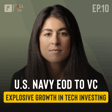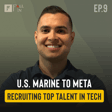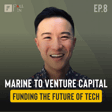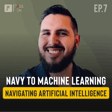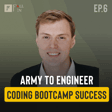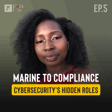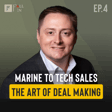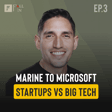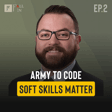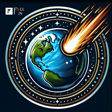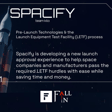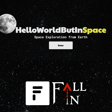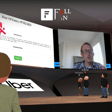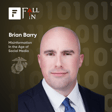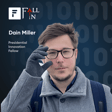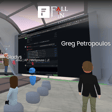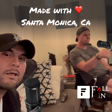Become a Creator today!Start creating today - Share your story with the world!
Start for free
00:00:00
00:00:01

Fall Into Tech #1 - Jameel Matin and Michael Rodriguez: From Military Service to Tech Careers
Join Marine veterans Jameel Matin and Michael Rodriguez as they kick off the Fall Into Tech podcast. Discover their journey from military service to thriving tech careers, packed with practical advice and inspiring stories. Learn about coding bootcamps, overcoming imposter syndrome, and leveraging AI in tech. Perfect for veterans considering a tech career or anyone curious about the industry's opportunities and challenges. Tune in for weekly interviews with tech professionals and fellow vets making waves in the digital world.
EPISODE LINKS:
- Fall In Hackathon
- Code Platoon
- Operation Code
- Y Combinator Startup School
- Chat GPT
- Claude AI
- Github Copilot
- Edabit
- Leetcode
PODCAST INFO:
- Podcast website: https://www.fallintotech.com/
- Youtube
- Apple Podcast
- Spotify
- Zencastr
SOCIAL:
HOST INFO:
Transcript
00:00:03
fall_in
All right.
Introduction and Podcast Overview
00:00:04
fall_in
Um, welcome everyone to the fall into tech podcast hosted by myself. I'm Jamil Madden and I'm here with my friend, Michael Rodriguez. We're two Marines turned techies. And on this podcast, we're going to chat with fellow veterans about their tech journey. Um, you know, from military to technology as well as other tech professionals so that we can help you with your tech career.
00:00:32
Michael Rodriguez
Yeah, ah tune in for weekly interviews where we discuss specific tech roles, career paths, and just general tips for succeeding in tech.
Mission to Support Tech-Interested Veterans
00:00:43
Michael Rodriguez
And you know, with this being episode one, um I guess why are we starting this podcast? Really, we just want to provide practical advice, share inspiring stories, um and just create a community for veterans in tech to really just help each other in our careers.
00:01:00
fall_in
Yeah, and we're also open to suggestions for changes to the podcast from listeners. So if you want to be on the show, let us know. We're going to drop our contact information in the description channel. So let's create a community where veterans can help each other in tech.
Military Training Stories
00:01:16
fall_in
um Michael, why don't we kind of break the ice by you telling us a funny military or tech career story?
00:01:24
Michael Rodriguez
yeah um Yeah, we're going to try to do this with every guest we have on. So I guess it's fair that we do it. um I'd say from military time, a funny story would be back when I was in kind of initial training to join the Marine Corps, I didn't know how to swim, right? So Marines are amphibious. So while everyone else was kind of doing pool PT and swimming laps, I was on the side just making sure I didn't drown. and learning how to swim. So thanks Gunny for ah making me keep getting in there. Appreciate you.
Military Service Experience
00:02:00
Michael Rodriguez
What about you, Jamil?
00:02:00
fall_in
Nice. Yeah, the I think it's called like the die for life. That must have been interesting for you you're if you weren't able to swim. But for me, you know I was a fat body and used a fat waver to get into the Marine Corps. Lost a bunch of weight. And my mom couldn't recognize me on on graduation day at MCRD San Diego. So I was just standing there. I was like, hello. um But yeah, yeah, she definitely was.
00:02:26
Michael Rodriguez
I'm sure she was happy though. That's awesome. Yeah, I guess. ah Yeah, tell us more about ah the Marine Corps. Why do you choose the Marine Corps and what years do you serve? What was your military occupation?
00:02:40
fall_in
Yeah, I mean, I chose the Marine Corps because if I wanted to be a bear, I wanted to be a grizzly bear. And I, you know, went into the ground level MOS. So my primary ah military occupation specialty was 0311, which stands for rifleman. And my secondary was 8152, which is Marine Corps Security Forces. And I was part of a
Best and Worst Parts of Service
00:03:05
fall_in
team called FASC team, Fleet Anti-Terrorism Security Team. If you've seen the movie um Rules of Engagement, it's a really good depiction of what fast Marines do quick reaction forces to embassies and and things like that so served from 2007 to 2012 and twelve and um You know was part of second fast company and then later with first battalion first Marines um one one down in Camp Horno and
00:03:32
fall_in
Yeah, Michael, what about you? What made you choose choose the Marines and and what years did you serve and your military occupation?
00:03:40
Michael Rodriguez
Yeah. Um, so I served from 2014 to end of 2020. Um, I was an artillery officer and yeah, I served in a few different units. So first one was Fox battery, uh, to 10 where I was fire direction officer. Then I jumped over to Kilo company three six, where I was the fire support team leader. And then I jumped back over to 210 was logistics officer for the unit, assistant logistics officer for the unit. And then I left 210 and went over to be an instructor at the basic school where we train brand new lieutenants before they hit the fleet. Um, yeah, so kind of stayed on the East East coast, uh, deployed on 24th view with, uh, BLT through six 2017. But yeah, that was pretty much
Why Transition to Tech?
00:04:34
Michael Rodriguez
my time in the Marine Corps for the most part.
00:04:37
fall_in
Cool, and for listeners that don't know what BLT, Battalion Landing Team, and so you were part of 3rd Battalion, 6th Marines um for the meteor there.
00:04:46
Michael Rodriguez
Yeah, pretty much a battalion organizes it to a battalion landing team and gets a bunch of attachments like artillery and AVs and all kinds of stuff. And that's how BLT is formed.
00:05:01
fall_in
Nice. um Yeah.
00:05:04
Michael Rodriguez
So yeah, what kind of going back to you, what was the the best and worst part of the military for you?
00:05:10
fall_in
You know, it was pretty intense. So that created a lot of camaraderie and being part of fast. ah We traveled a lot to places like Roto, Spain, and ah Israel, um and
Resources for Transitioning to Tech
00:05:23
fall_in
you know Cuba as well. And then when I hit the fleet with 1-1, we did a mu, hit up Australia, Dubai, um you know other other countries in the Middle East like Kuwait, and um got ah got to see a good chunk of the world. um
00:05:41
fall_in
And when I think about the worst parts of the military, I think about like, you know, the last minute changes to schedules or, you know, we just hit a port in Australia or something. And they're like, all right, guess what? You know, your sections got duty for the for the first two days or something like that. And so morale would go down. um Just those little surprises didn't really fit well with me. But It's the nature of how the Marine Corps works, um or at least ah that's how it worked at that time. But yeah, what about you, Michael? What was what would you say is were the best parts and the worst parts for you?
00:06:18
Michael Rodriguez
Definitely agree with you on the traveling. That was definitely fun. But I'd say the best part was probably just the people. I felt like we' we're always kind of in a group of friends
Advice for Breaking Into Tech
00:06:28
Michael Rodriguez
no matter what was going on just because of the way, you know, units are set up and the way you go different places. So I feel like you were always hanging out with friends even during not so fun times. And then the worst part, I would say, would just be, you know, the classic um doing things you don't want to do sometimes as far as sitting in the rain, it's cold, you're hungry, you're tired, whatever it may be, you're always going to have those parts no matter who you are in the military. So just, you know, some of those parts um sometimes are not so fun.
00:07:02
fall_in
Yeah, I agree. I think after, you know, I've been out since 2012 and I kind of forget about, you know, the feel life and, you know, what I realized is like you kind of, you forget the pain, but remember the glory and, um, that's That's kind of how I remember the Marine Corps nowadays. But um let's talk about you know why we're doing this podcast. So why did you choose to transition into tech instead of another field? I imagine being like a ground artillery officer.
00:07:34
fall_in
um you know Tech is so kind of like the opposite of that. So I'm curious to hear how you transitioned.
00:07:41
Michael Rodriguez
Yeah, there there weren't too many artillery roles in the civilian sector open. But yeah, a lot of my friends transitioned to kind of leadership roles. That's kind of the most marketable experience we have. So getting into tech was a little different, especially because I majored in criminal justice. But while in the service, I always liked messing with the latest tech gear, um whether it be talking to aircraft or tracking troops. and
Tech Career Journeys
00:08:12
Michael Rodriguez
um You know, people would come to me for help setting up different tech things that we would use. So I wanted to leave the military and find a way to still learn the newest tech, build something of my own, um which is kind of what led me to do the whole software engineering thing. What about you?
00:08:32
fall_in
very cool. Yeah, I mean, when I got out in 2012, I did a series of career changes. um You know, as soon as I got out and went to college, I went to San Diego State got a degree in international security and conflict resolution. And I thought I was going to do Government work. I know some languages um I could read Arabic and thought I was gonna continue something in the defense, you know industry and I had two years my GI Bill remaining so I wanted to get like a professional degree was debating between like a masters or an MBA um but
00:09:11
fall_in
i yeah I started going through and endeavoring towards law school. you know Studying for the LSAT, which is predominantly logic type questions, so was taking courses on the LSAT for like know three or four months. and um I was doing Uber at that same time, and when I was doing that, I would take like little
Breaking Into Sales and Growth Roles in Tech
00:09:33
fall_in
bathroom breaks at my buddy's startup in LA. And when I walked into his um office, it's totally different from anything I've ever seen. There's just like snacks everywhere. People are wearing like shorts and flip-flops.
00:09:51
fall_in
and um There was just this buzz in an open office um environment, which I haven't seen before. Totally different from like the classic you know law firm where everyone's wearing like a suit and tie. or ah you know It's like not as highbrow, but um just the culture really really um made me gravitate towards tech. i um Yeah, I think it was just it was just those things, what led me there.
00:10:22
fall_in
um
00:10:22
Michael Rodriguez
next Snacks will entice you.
00:10:25
fall_in
The snacks will get you, especially coming from a you know fat body
Pros and Cons of Working in Tech
00:10:29
fall_in
life here. But um you know when you think about transitioning, what resources did you use to get into tech um and what resources were lacking?
00:10:42
Michael Rodriguez
Yeah. So when I was still on active duty, I was trying to figure out what I want to do and decided I wanted to do something in tech with no tech experience. So I start just going on good old Google and researching what roles in tech there are, what they mean, as much as I can, just from random articles and this and that, and ended up finding software engineering. Once I found that. Well, I figured out I didn't know how to code. So I started going on YouTube to start just watching some tutorials. You know, whenever I was in the field, I was trying to code pretty much. um And once I learned the basics, I knew I needed to take it to kind of another level. I didn't know if I want to go back to school or what.
00:11:28
Michael Rodriguez
I found this program called Code Platoon. Again, not sponsored, right? But it was a great program. It's about three and a half months and you just learn full stack software development, full stack being front end and back end, front end being you know what a user sees on let's say a web app, back end being database and stuff that holds the data. And so I went through code platoon, coded a lot every single day. And then towards the end, I used something called leak code, which is a website where you can practice coding challenges, which is what is used for coding interviews um when you interview for companies. So that's really what I used. And then
00:12:15
Michael Rodriguez
was able to kind of leverage all that to get a job with the help of Code Platoon. um What about you?
00:12:22
fall_in
Very cool.
00:12:23
Michael Rodriguez
ah Well, actually, you actually mentioned what was missing as well, right?
00:12:25
fall_in
Yep.
00:12:26
Michael Rodriguez
So for me specifically, I would say people to talk to in tech. Like I said, not too many people I knew, if any, transitioned into tech and didn't really have anyone to reach out to who asked for tips on, asked about roles and this and that. So I guess that's also part of why we are doing this podcast. um But yeah, what about you? What resources did you use? What was missing?
00:12:50
fall_in
Yeah, similar story to yours, a lot of Google, um you know a lot of Stack
Episode Wrap-Up and Future Directions
00:12:55
fall_in
Overflow. you know I told the listeners earlier that I was kind of shifting from law into tech and I came across a book called Quit Law and Code written by William Haw. And the two main kind of um points he made in that book was time and return of investment. And that really made a lot of sense to me. um you know That book talked about how to get into coding boot camps and things like that. So I went through a couple of coding boot camps myself, Sabio in Culver City, Los Angeles, and then V School down in Salt Lake City, Utah.
00:13:31
fall_in
um and use other software platforms to help me learn. Code Academy, which was starting to kind of take off back in 2014. And so, of you know, diving into like HTML, CSS, and then graduating from there to like free code camp. And then, you know, right into this platform called edit it similar to lead code but um it's more like crawl walk run and. um
00:14:06
fall_in
it was just like a really nice way for me to like level up on my coding. So a lot of credit to to add a bit. um As far as what resources were lacking, I think similarly to what you gave, um a lot of like unknowns and and it was like really tough to like figure out those unknowns because there's so many resources out there in the cesspool of information. So, um you know, ah Luckily, I found like Operation Code, which is super helpful.
00:14:36
fall_in
They have really great mentors and um that that community really helped me kind of break into tech as well. um Yeah.
00:14:46
Michael Rodriguez
Nice. Nice. Yeah. Kind of with, I guess, what you know now. um What advice would you give to your younger self or someone else maybe trying to break into tech?
00:15:00
fall_in
I would say, um for me, I think just really honing down the principles of computer science, like the solid principles and the dry principles, rather than trying to land my first job right away. um That's the advice I would give myself, really hone down the fundamentals before trying to like step into the industry. um I think having the fundamentals and building more projects would have definitely decreased the level of like imposter syndrome that I i first had. um Yeah, what advice would you give to your younger self, Michael?
00:15:36
Michael Rodriguez
I guess kind of going off the imposter syndrome thing, step one, try not to compare yourself to anyone else except your previous self, because there's always someone that's better at coding, always someone who's got the role you want to get to, whatever it may be. So I would just start with, you know, it's possible, right? Because I took a risk myself trying to get into tech when I was leaving active duty, because, you know, I didn't have a job lined up when I left active duty, I was going to coding bootcamp and then kind of seeing how it worked out. Um, so, you know, believe in yourself and you can do it. Just have a plan, have a set plan, um, which you have researched, make sure it's the role you want, um, so that you're not kind of having to do too many shifts later on, even though things will happen. Um, yeah, just have a plan, use that same with work ethic from the military and civilian world. And you know, things will work out, I think.
00:16:33
fall_in
Nice. um So tell us more about your background now. How long have you been working in tech and what roles and companies have you been a part of?
00:16:43
Michael Rodriguez
Yeah, so I've been in tech now, again, pretty much right after I finished Code of Platoon, which is right after I got off the military. So a little over three years now. um First, I worked at JPMorgan Chase as a software engineer um on a fairly large team, 100 plus people building an app for some clients. And that was a great experience, just getting kind of thrown into this large team, learning how software engineers run things with you know daily stand-up meetings, which is where people give um their updates from yesterday, today, any blockers, things like that, how we talk to clients to figure out what they want in the app, how that gets translated into building the app and then refining it. So that was great. And then I ended up leaving there after about a year because I wanted to come back to North Carolina for personal reasons.
00:17:41
Michael Rodriguez
And I ended up getting a job at another financial institution where I'm at now. And I've been here for about two years. And it's great as well. um A lot different still because this team is only about 10 people. And instead of kind of maintaining and building on legacy code, we were building a brand new app here. So got to see kind of both sides of legacy versus new app, small team, big team. um And yeah, I've really enjoyed it so far.
00:18:12
fall_in
Nice.
00:18:13
Michael Rodriguez
What about you um but roles? How long you've been in the industry now?
00:18:19
fall_in
Yeah, about seven years and, you know, all across the gamut, I would say from software development to um growth and marketing to, ah you know, recruiting and hiring to even sales like B2B and business to um ah consumers and like B2B businesses to business um type sales and you know my first role was at this venture capital firm in Brettwood, California. They were building like Yelp for beaches and um that's where I kind of got my first taste of startup life and
00:18:59
fall_in
um really kind of wanted to learn about startups. On my off time was doing courses with like Y Combinator Startup School, started volunteering for organizations like Operation Code. I became their director of public policy. um And um you know for example, the growth roles, we for folks that don't know what growth marketing is, you're Basically, utilizing um you know you're you're um trying to grow the company using um data.
00:19:40
fall_in
right so To give you an example, um I think growth became popularized with ah this individual named Shamath Palahapatiya, who's now a billionaire.
00:19:46
Michael Rodriguez
you
00:19:52
fall_in
um He, I think, stood up Facebook's growth team, you know started the think about like hey we need a mobile app we need a translate from english to other languages so other people can use it and you know i can't think of any company that doesn't wanna grow so growth markers you know using data try to experiment on different ways to help the company grow. um you know I've done hiring as well. um you know The company that I was hiring for, 75% of their engineers has a PhD. So we were really looking for cream of the crop people and taught me a lot about how to approach hiring and um just that whole sort of process. um And then sales side of things.
00:20:38
fall_in
um you know a lot of you know, thinking about what ways we can help people solve their problems with our software and kind of creating a narrative how our software will solve their problem. um So you got to do a lot of outbounds, a lot of calls, a lot of follow ups, a lot of like objection handling, that sort of thing. um So yeah, that's good.
00:21:06
Michael Rodriguez
i guess I guess a question on that. um So I know talked about for for me to get into software engineering, I did the coding bootcamp. I know a lot of people do that. I know a lot of people also go to college and do a computer science degree or some kind of technical degree, or maybe you just learn to code on your own and build some projects and you're able to show that to employers. um But now to get some of these sales roles or growth roles, what does that look like to actually get in into those roles as far as skills you need, how you get in.
00:21:38
fall_in
Yeah, I think you know if you can start with like freelancing or um demonstrating that you have sales skills. um you know For me, I first got into a startup where they were just looking for somebody to get things done. So it was like a general I don't know, like a doer, which involved a lot of different things. And um part of that was sales, you know, building lists, reaching out to people. And that's how I kind of build my resume for the sales side of things um for somebody that's looking to break into sales.
00:22:14
fall_in
um you know start ah Start freelancing, start maybe reaching out to companies and and putting yourself out there and um try to get an internship and in a sales role. um Seek mentorship and um yeah ah just do a lot of online classes on like tech, um you know saas software sales, things like that. um But you know once you get into the groove of things, um you start building your sales pipeline, you start closing deals. um It's an unbelievable feeling when um kind of like um you just rely on that process and then the process the process rewards you. So those are some of the resources on on how to break into sales.
00:23:09
fall_in
um So yeah, you you know um you I'm curious, what would you say are the best and worst parts of working in tech for you?
00:23:25
Michael Rodriguez
For me, I would say the best part is you're never bored, I guess. There's always a new problem to solve as far as coding for the app. There's always a new feature to add for the app. There's always a new language or framework or new technology to learn. um So it's never boring, changes every day. um Worst part. Technology is always changing right as well so it can be um daunting, perhaps, sometimes as far as I just learned this technology but now they just.
00:23:59
Michael Rodriguez
changed it to this whole thing and this is the latest and greatest. um So you have to be able to manage just picking a reliable stack, especially as a ah new software engineer and just diving into that instead of trying to be distracted by you know every little shiny new toy that comes out in the tech sector. What about you for best and worst?
00:24:20
fall_in
Yeah, I think the best part is like the ability to you know create something from your imagination. um you know I did that with the but the fall in hackathons. like I had this idea of creating hackathons for veterans as they were breaking into tech. And you know with this idea, I was able to build a you know ah ah web presence and start working on SEO. and um just like how you can use tech to like grow an idea is really fascinating to me and I mean technology in itself is just so fascinating how you know from like
00:25:02
fall_in
top-down, like you start writing in HTML, CSS, JavaScript, and how that ultimately gets written down, and memory is super fascinating to me. um The worst parts for me right now is like how volatile tech is. um you know It's pretty unpredictable on how things are going to unfold in the future as far as like um you know AI coming in and kind of ah What's the right word here? like
00:25:33
fall_in
um Disrupting the industry, I would say. um you know There's platforms out there that will code for you, write tests for you. And ah it does it so quick and and so like effortlessly. um so um And then you also hear about tech layoffs as well. So those are kind of like the main worst things about tech for me. So yeah.
00:26:00
Michael Rodriguez
Yeah, I'd say that, uh, as far as AI goes right now, especially, I think software engineers, you know, maybe later in the future, I don't know what's going to happen, but for right now, I think you just need to learn how to leverage it. Um, maybe it's chat GPT or get hub co-pilot helping you write code faster and more efficiently, or help you write documentation, whatever it may be, but definitely should be leveraging it and learning it. to some degree, or anyone should, not just software engineers, but um definitely agree with that.
00:26:33
Michael Rodriguez
and then
00:26:33
fall_in
Yeah, it's a great way to learn as well using these tools. like you could you know For example, it's like, hey, explain it to me like I'm five. How to how does promises work in JavaScript? It's a lot quicker, I think, go and instead of like you know ah combing through the documentation and stuff like that. So it's it can be really incredibly helpful when it comes to learning as well.
00:26:58
Michael Rodriguez
Definitely, I know you mentioned kind of the fall in hackathon I'll help you plug it there because I was a once a participant in the in the hackathon um in the very first fall in hackathon um and Was awarded a best presenter I think just because you felt bad for me though, but um um But yeah, that was ah that's a great a Hackathon you got going there
00:27:11
fall_in
Yeah No, I think you were
00:27:23
Michael Rodriguez
um And you know you you know what, you mentioned startups as well. I think you mentioned Y Combinator, but if you are interested in startups, I think like we both are, that startup school program they have um has some great courses there as another resource for you if you're kind of looking to go the startup route. So we can link that as well in the description. And we'll also link, you know, anything else we've talked about, whether it be ah code platoon or different resources we used while we were trying to get into tech. We'll link that stuff all in the description, um as well as our personal LinkedIn's in case people want to reach out to us. um But yeah.
00:28:03
fall_in
Sweet. Yeah, I think as we close this out, people can visit fallintetech.com. We'll have that in the show description and we'll post all our social media channels as well for you guys to check out. But um yeah, this has been awesome. Thanks again, Michael, for talking with me and I'm excited for Future guests, we've got ah quite a few lined up here. And um I think we can really create a ah really blossoming community of of veterans in tech.
00:28:34
Michael Rodriguez
Say amen. Looking forward to the future.
00:28:36
fall_in
All right. Great chat. Great chat with you.
